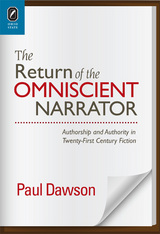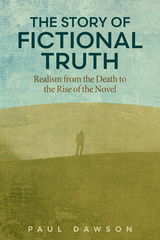2 books about Dawson, Paul

The Return of the Omniscient Narrator
Authorship and Authority in Twenty-First Century F
Paul Dawson
The Ohio State University Press, 2013
The Return of the Omniscient Narrator: Authorship and Authority in Twenty-First Century Fiction by Paul Dawson argues that the omniscient narrator, long considered a relic of the eighteenth- and nineteenth-century novel, has reemerged as an important feature of contemporary British and American literary fiction. It further argues that the development of contemporary omniscience can be situated in relation to ongoing anxieties about the novel’s decline of cultural authority in the age of digital media. In this context the book identifies and classifies new modes of omniscient narration that are neither nostalgic revivals nor parodic critiques of classic omniscience, but the result of experimentations with narrative voice in the wake of postmodern fiction.
To address this phenomenon, the book reformulates existing definitions of literary omniscience, shifting attention away from questions of narratorial knowledge and toward omniscient narration as a rhetorical performance of narrative authority that invokes and projects a historically specific figure of authorship. Through a study of fiction by authors such as Zadie Smith, Jonathan Franzen, Richard Powers, Martin Amis, Rick Moody, Edward P. Jones, and Nicola Barker, the book analyzes how the conventional narrative authority of omniscient narrators is parlayed into claims for the cultural authority of authors and of the novel itself.
In the course of its investigation, The Return of the Omniscient Narrator engages with major movements in narrative theory—rhetorical, cognitive, and feminist—to challenge and reconsider many key narratological categories, including Free Indirect Discourse, the relation between voice and focalization, and the narrative communication model. This challenge is framed by an argument for a discursive approach to narrative fiction that addresses the neglect of authorship in narrative theory.
To address this phenomenon, the book reformulates existing definitions of literary omniscience, shifting attention away from questions of narratorial knowledge and toward omniscient narration as a rhetorical performance of narrative authority that invokes and projects a historically specific figure of authorship. Through a study of fiction by authors such as Zadie Smith, Jonathan Franzen, Richard Powers, Martin Amis, Rick Moody, Edward P. Jones, and Nicola Barker, the book analyzes how the conventional narrative authority of omniscient narrators is parlayed into claims for the cultural authority of authors and of the novel itself.
In the course of its investigation, The Return of the Omniscient Narrator engages with major movements in narrative theory—rhetorical, cognitive, and feminist—to challenge and reconsider many key narratological categories, including Free Indirect Discourse, the relation between voice and focalization, and the narrative communication model. This challenge is framed by an argument for a discursive approach to narrative fiction that addresses the neglect of authorship in narrative theory.
[more]

The Story of Fictional Truth
Realism from the Death to the Rise of the Novel
Paul Dawson
The Ohio State University Press, 2023
In The Story of Fictional Truth, Paul Dawson looks anew at the historical relationship between the genre of the novel and the concept of fictionality, arguing that existing scholarship on the emergence of realist fiction has been shaped by the trope of the death of the novel. The unexplored logic of this premise is that the novel was born anticipating its own demise, with both its requiem and its reflexive origins legible in the ontological challenge of postmodern metafiction. To test this logic, Dawson traces shifting assumptions about what constitutes the illusion of fictional truth from early novels such as The History of Miss Betsy Thoughtless (1751) to contemporary autofiction such as Megan Boyle’s Liveblog (2018). In doing so, he contests and revises long-held views about the origins and functions of key formal features of the realist novel by investigating when and how they came to be seen as signposts of fictionality. Through this history, The Story of Fictional Truth opens up new ways to understand the novel’s afterlife in a post-truth digital age characterized by a collapse of referentiality.
[more]
READERS
Browse our collection.
PUBLISHERS
See BiblioVault's publisher services.
STUDENT SERVICES
Files for college accessibility offices.
UChicago Accessibility Resources
home | accessibility | search | about | contact us
BiblioVault ® 2001 - 2024
The University of Chicago Press









